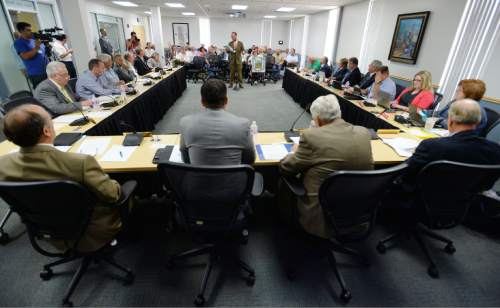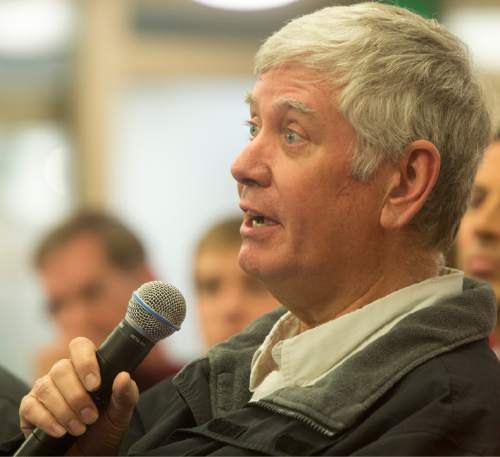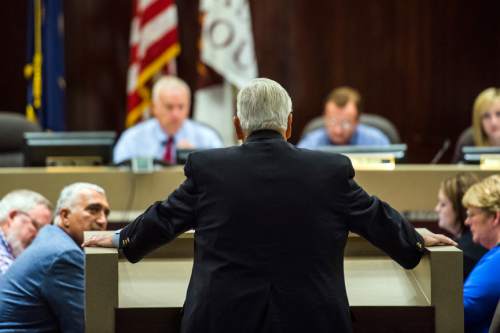This is an archived article that was published on sltrib.com in 2016, and information in the article may be outdated. It is provided only for personal research purposes and may not be reprinted.
Utah Transit Authority Board members discussed some sensitive topics in closed-door committee meetings last week, including the possible tripling of fees for publicly releasing UTA police reports, and how well the agency serves minorities and low-income people.
The agenda also included possible discussion of a newly completed customer-satisfaction survey, development of a new fare structure and an update on UTA partnerships with developers for "transit-oriented developments" at rail stations.
That's according to electronic information packets prepared for board members, obtained through an open-records request by The Salt Lake Tribune.
"It does not seem very transparent," said Christopher Stout, president of the watchdog Utah Transit Riders Union. "It will be a concern until they reopen those meetings."
Until this month, those meetings were open to the public — and The Tribune routinely sought and obtained such board packets with background materials, usually just minutes before meetings began.
But UTA this month said the meetings are no longer public because committees now will not make any final policy decisions — the full board will. UTA says that change increases transparency because more discussion, with more public participation, should occur at full board meetings.
However, Jeff Hunt, a media attorney, has said Utah's open meetings law still requires advisory meetings, such as by the UTA committees, to be open to the public.
In the past, such committees often have worked through issues to the point that final votes by the full board came with little discussion.
UTA Board Chairman H. David Burton also said last week that the agency closed the committees because it disliked Tribune coverage of them. "You really want to know the truth?" Burton told a Tribune reporter asking why the meetings are now closed. "Because you screw us up."
—
Backlash • Closing the committee meetings has brought criticism from politicians such as Gov. Gary Herbert and his GOP opponent, Jonathan Johnson. Members of the Salt Lake County Council are threatening to block disbursement of sales taxes collected for UTA if it does not reopen the meetings.
The Utah County Commission also has on its agenda for Tuesday a resolution calling for UTA to open its committee meetings.
State Auditor John Dougall has joined politicians questioning the closed meetings, and he is supporting the County Council's pushback.
Dougall, a Republican, posted on Facebook this week, "I've been telling counties for years that if they aren't happy with UTA they have a lot of power to bring accountability. Salt Lake Co provides more funding to UTA than any other county in UT. If SL Co chooses to freeze funding I think it will quickly prompt UTA's board to reconsider the policy causing concern."
Documents newly obtained by The Tribune show at least two committees met on May 12. The Tribune planned to protest the newly closed meetings in person that day, but it was turned away at the sign-in desk by a receptionist who said she knew of no such meetings scheduled.
One issue discussed by the UTA Stakeholder Relations Committee was updating the agency's rules on how it complies with open-records requests. That includes a proposal to raise fees for individual police reports from $5 to $15, and to continue a practice of providing them only to people named in the reports.
"That's a big deal," said George Chapman, a Utah Transit Riders Union member who often had attended committee meetings in the past.
"I still hear comments that parking lots are unsafe," and some riders question how safe trains and buses are. He said raising such fees would make it more difficult to find the truth. "Crime reports should be very public."
The Stakeholder Relations Committee also received and perhaps discussed a report on how well UTA serves minority and low-income areas.
UTA received 157 complaints in 2013-2015, alleging discrimination based on race, color or national origin in its transit-related activities, according to the report. It says the agency found that 64, or 41 percent, had "no cause." It adds that 28 complaints led to coaching for operators.
Buses in minority and low-income areas had fewer overcrowded trips, had more frequent trips and usually had newer equipment than in other areas, the report said. Stops in minority and low-income areas also had more benches, shelters and lights than in other areas.
The report said 55 percent of UTA riders are "low-income" (defined as below $35,000 a year), 25 percent are "moderate income" ($35,000 to $75,000) and 20 percent are "high income" (more than $75,000).
—
Open meeting • An updated plan on how to serve minorities and low-income riders is on the agenda for the full board meeting Wednesday, as is the proposed update on open-records law policies.
That agenda was posted online a week in advance, much earlier than in the past, and contains links to some background materials — and now offers the public the chance to comment about agenda items online. The Stakeholder Relations Committee packet last week also included a report on how well UTA is meeting some goals in areas that the subgroup oversees, including saying that the agency has completed an annual survey on customer satisfaction. Documents released did not include results of that survey.
"Doing a secret customer satisfaction survey is ridiculous," Chapman said about releasing such information in a closed-door meeting.
Also, the report said, "staff is currently working on UTA's future fare policy, developing a comprehensive multiyear proposal for the public fare structure." It said UTA will present that in the second quarter of this year, after which "staff will conduct a proactive public outreach and input effort."
The UTA Planning and Development Committee had on its agenda last week a review of transit-oriented developments. No background documents about that were included in packets released through the open-records request.
Chapman was disappointed that such a discussion was behind closed doors. "Closing the meeting essentially allows them to do the sweetheart deals with developers, in my opinion.
"They got in trouble with it in the last audit" by the Legislature.
The full UTA Board is scheduled to meet at 1 p.m. Wednesday at Utah Valley University in Orem, in a classroom building at 800 W. University Parkway in rooms 510 and 511.
Not on the formal agenda is any discussion of its new policy to hold committee meetings behind closed doors.







